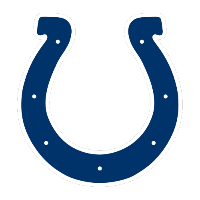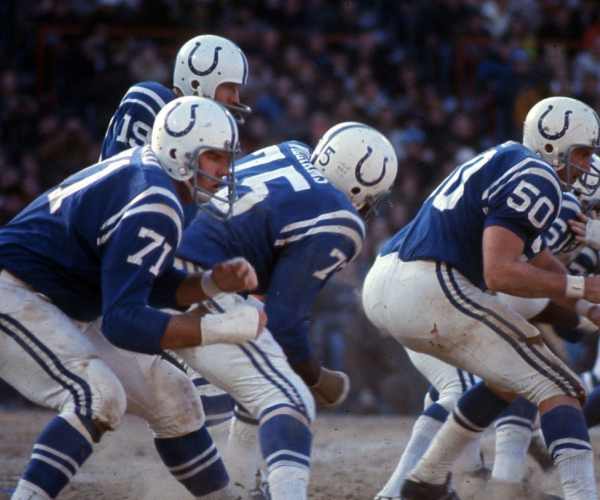
Indianapolis Colts

1953 Indianapolis
The history of the Indianapolis Colts, a franchise with roots dating back to 1953 when they began as the Baltimore Colts, is a rich tapestry of accomplishments, challenges and iconic moments in professional soccer. This franchise, which moved to Indianapolis after the 1983 season, has been home to some of the sport's most legendary names and has left an indelible mark on the NFL.
The origins and early successes of the Indianapolis Colts, initially known as the Baltimore Colts after their founding in 1953, laid the foundation for one of the NFL's most iconic franchises. The acquisition of the remnants of the Dallas Texans team by a group led by Carroll Rosenbloom brought with it not only a new identity for the team in Baltimore, but also a new era of success in professional soccer.
Establishment in Baltimore
The Colts' arrival in Baltimore marked the rebirth of professional soccer in the city. With strong community support and a solid base of fans who purchased season tickets, the Colts began to build what would become a rich history in the NFL. Under the initial leadership of coaches like Weeb Ewbank, and with on-field talent like Johnny Unitas, the Colts began to forge their legend.
Roads to Glory
The 1950s saw the Colts reach the pinnacle of NFL success, culminating with championships in 1958 and 1959. These triumphs not only cemented the Colts as a powerhouse within the league, but also played a crucial role in popularizing professional soccer. The 1958 championship, known as "The Greatest Game Ever Played," was particularly significant. This showdown against the New York Giants was decided in a thrilling overtime, the first in NFL championship history, and captured the imagination of millions of fans, raising the profile of American soccer across the country.
Lasting Legacy
The Colts' early successes not only set a precedent for the team, but also left a lasting legacy that continues to influence the franchise today. The tradition of excellence started in Baltimore laid the foundation for future success, even after the team's move to Indianapolis. The Colts' history in Baltimore is a testament to the impact a team can have on its community and the sport it loves.
These early origins and successes of the Colts reflect a formative era not only for the franchise but also for the NFL, marking the beginning of what would become one of the richest histories in professional soccer. As the franchise continues to build its legacy in Indianapolis, the memories of those early years in Baltimore remain as a reminder of where it all began and what has been accomplished since.
The Colts' move from Baltimore to Indianapolis in 1984 is one of the most significant and controversial chapters in NFL history. This transition not only represented a geographic shift for the franchise, but also marked a profound change in the team's culture and identity, as well as its relationship with the league and its fans.
Crisis in Baltimore and the Decision to Move
The decision to move the team came against a backdrop of growing tensions between Colts owner Robert Irsay and the city of Baltimore, which was failing to meet Irsay's demands for a new stadium and improvements to existing facilities. The situation came to a head when the Maryland legislature passed a law that would allow the city of Baltimore to take control of the team through eminent domain, forcing Irsay's hand to act quickly.
The Move to Indianapolis
In response to mounting pressure and with enticing offers from several cities, Irsay accepted the Indianapolis proposal, which included a $12.5 million loan, a $4 million training complex and use of the newly built Hoosier Dome. In a transaction conducted under the cover of night to avoid legal intervention, the Colts moved to Indianapolis, beginning a new chapter in their history.
Impact and Reactions
The move was met with mixed feelings. In Indianapolis, the arrival of the Colts was celebrated as a great achievement for the city, eager to establish its presence in the professional sports landscape. In Baltimore, on the other hand, the team's departure left a void and a wound in the hearts of its fans, who felt betrayed by the abrupt departure of their beloved team. The controversy over the move contributed to broader debates about the loyalty of sports franchises and their obligations to local communities.
Building a New Identity in Indianapolis
Despite the initial challenges and controversy surrounding the move, the Colts began to build a new identity in Indianapolis, taking advantage of modern facilities and the enthusiastic support of their new fan base. The transition eventually led to periods of on-field success, including Super Bowl victories, and helped cement the Colts' position as a respected franchise in the NFL.
The Colts' move to Indianapolis is a reminder of the complexity and challenges sports franchises face in their relationship with the cities and communities they call home. Over the years, the Colts have managed to blend into the fabric of Indianapolis, creating their own history and tradition in their new city, while Baltimore eventually welcomed a new team, the Ravens, ensuring that professional soccer would continue to flourish in both cities.
During their time in Indianapolis, the Colts have experienced both the dominance and challenges that come with the competitive NFL environment. Under the leadership of iconic figures like Peyton Manning, the Colts reached the pinnacle of success, winning Super Bowl XLI and securing numerous playoff appearances, an era that marked the franchise as one of the most successful in the league during that time.
Dominance in the New Millennium
The Peyton Manning era, which spanned the late 1990s through the early 2010s, was characterized by a formidable aerial attack and innovative game strategy that often left opponents scrambling for answers. Super Bowl victories and consistent playoff appearances during this period demonstrated the Colts' dominance in the AFC and cemented their reputation as an NFL powerhouse.
Challenges and Rebuilding
However, Manning's departure in 2012 ushered in a new era for the Colts, one that has seen its share of challenges. The search for a viable successor to Manning led to the drafting of Andrew Luck, who, despite showing flashes of brilliance, faced challenges due to injuries and ultimately retired prematurely. These years have been a period of transition and rebuilding for the Colts, looking to return to prominence in the league.
Lasting Legacy and Promising Future
Through the ups and downs, the Colts have maintained a legacy of excellence and contribution to professional soccer. With legendary figures associated with the franchise and a loyal and passionate fan base, the Colts continue to be a symbol of perseverance, innovation and community in the sport. As the franchise looks to build on this legacy, the hope of returning to the glory days and competing for another Super Bowl title remains alive among players, staff and fans.
The rich history of the Indianapolis Colts, from its founding to its present day, reflects not only the evolution of the team but also its impact on the NFL and sports culture. As the Colts continue to write new chapters in their history, the team strives to leave an indelible mark in the hearts of their fans and in the yearbook of professional soccer.








































